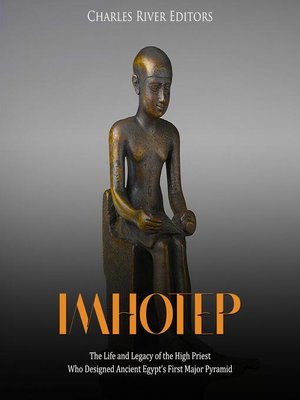Imhotep
audiobook (Unabridged) ∣ The Life and Legacy of the High Priest Who Designed Ancient Egypt's First Major Pyramid
By Charles River Editors

Sign up to save your library
With an OverDrive account, you can save your favorite libraries for at-a-glance information about availability. Find out more about OverDrive accounts.
Find this title in Libby, the library reading app by OverDrive.



Search for a digital library with this title
Title found at these libraries:
| Library Name | Distance |
|---|---|
| Loading... |
While the Great Pyramid of Giza is the most recognizable, the tradition of pyramid building was a long one in ancient Egypt occurring over hundreds of years, with techniques developing and improving, only to be forgotten and lost again. As a result, even as subsequent generations contributed new large-scale construction programs that changed the face of Egypt, they did so in quite different manners. The first of these was the Step Pyramid, located in the northwest of the city of Memphis in the Saqqara necropolis of Egypt. Today it is known as the Step Pyramid due to its stepped appearance, but in Egyptian times it was referred to as kbhw-ntrw. Commissioned by and made for the burial of the pharaoh Djoser, its design and construction was overseen by his vizier Imhotep.
The name Imhotep has since become infused with popular culture through the popular series of Mummy movies, where the mummified remains of Imhotep are reanimated through the power of an ancient curse, leading to the shambling, linen-wrapped and decomposing undead monster haunting the hapless treasure seekers who dared disturb his resting place.[1] In reality, the ancient Imhotep was a talented architect and builder who succeeded in creating something that had never been seen before.
In fact, Imhotep is considered by many to be the world's first true scientist, or at least the first scientist known by name. Although the historical references to Imhotep are disparate, fleeting, and dispersed over a time span of nearly 3,000 years, he is without doubt one of the most influential people in early Egyptian and ancient history in general. Few ancient Egyptians who were not kings are known today, and almost none have been so revered or worshiped long after their deaths as Imhotep was.







